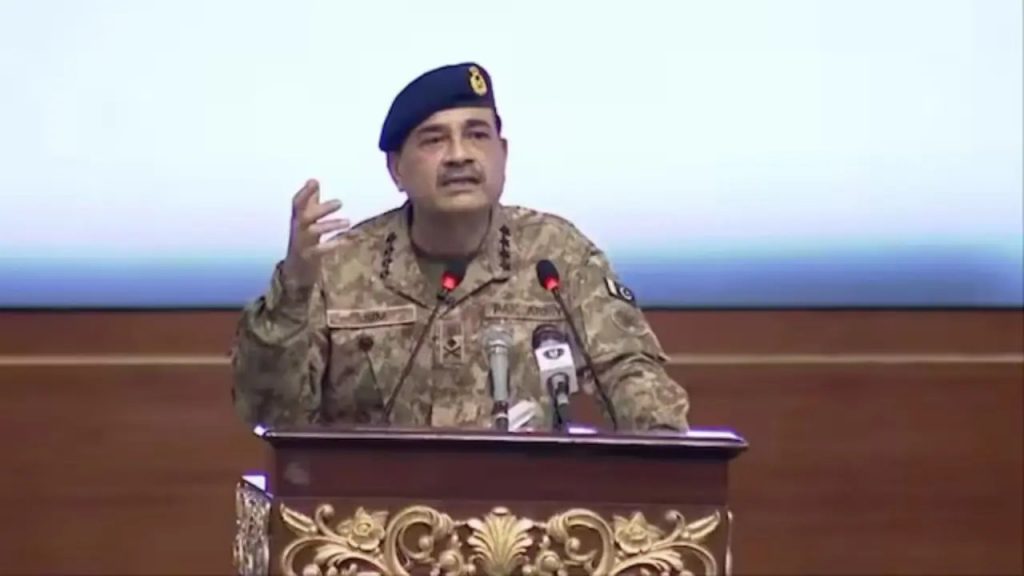NewsGate Press Network
By Pankaj Vohra
Pakistan Army chief, General Asim Munir’s provocative and incendiary speech that has gone viral, seeks to reinforce the Two-Nation theory, which led to the unfortunate partition of India way back in 1947.
The speech was most uncharacteristic, coming as it did from the serving head of a uniformed force.
Had a political leader made this kind of a statement, one could have comprehended it in the context of his ambitions, and attempt to endear himself to a section of the population.
However, General Munir articulating his thoughts acquires a different meaning. Obviously, he is sending a hard-hitting message to Muslims living in India to drive home the point that they were in every manner different from their Hindu brothers.
As it is, there is enough hatred being spread by politicians, and so the timing of the Pakistan Army chief’s utterances, coincides with the visit of a US Congressional delegation to his country as well as the adoption of the Waqf Amendment Act in India.
What is appalling is that soldiers never express themselves like this, particularly when there is an elected government in place in Islamabad.
It is obvious that he is conscious of the fact that he is exceeding his brief, and he desires to reassert that the Army had overriding say in the scheme of matters in Pakistan.
The partition of India, done at the behest of Mohammad Ali Jinnah, who allegedly did not adhere to the primary tenets of Islam, as well as the Muslim League, failed to recognize the existent basic reality.
Contrary to what General Munir stated, the people of every faith have a mind, and could think alike since their basic necessities are similar.
The Hindus, as well as people of any other belief, are also governed by the impulse to survive, thrive, and move forward. However, this cannot be at the expense of spreading hatred.
India and Pakistan have a shared past and the two major communities had co-existed for centuries.
Ethnically, by and large, the people belonged to the same stock. A large segment of Muslims are converts, and there could have been multiple reasons for it. General Munir spoke about Kashmir which he claimed was illegally occupied by the Indian forces.
Here there is also a sizable section of Pandits who embraced Islam out of variable compulsions. These are chronologically recorded facts unless the Pakistan Chief wishes to distort history.
General Munir should remember, that even though Jinnah is regarded as the Father of the Nation in his desired land, his very own daughter, chose to live in India out of love. What he spewed resulted in sowing the seeds of Pakistan and carving out another country.
Why is the General attempting to ignite a debate that is long over? If there was a common thread which knitted Pakistan, he should explain why the Army perpetrated inhuman atrocities against its “own people” in its Eastern part, leading to the birth of Bangladesh.
It is evident that Muslims in both far-flung geographical regions were so dissimilar, and their priorities, as also their ambitions, were totally variant.
Allama Iqbal, whom the general ebulliently quoted in his speech, is very much hailed as a liberal by many of his admirers due to his progressive poetry and thoughts at one time.
However, ironically, he played a major role in putting forward the idea of a separate Islamic nation, which lowered his image in the eyes of some of his followers.
The general needs to be reminded that the consequences of what he is attempting to achieve, can be summed up in Iqbal’s early poetry, particularly the verse, “Oh Fikr kar Nadaan Museebat Aaane wali hai, Teri Barbadiyon ke Mushware hain Aaasmano mein, Na Samjhoge to mit jaoge Pakistan Walon (Hindustan in the original poem), Tumhari Dastan tak na hogi Dastaano mein.” (Oh, you ignorant person, you are unable to anticipate the peril that is storming from the skies.
If you do not comprehend what is in store, brace yourself that your story would not find a place even in the entire compilation of multiple historic tales!)
There is no doubt in anyone’s mind that Pakistan is a failed nation where unlike what the Army chief said, there has been an institutional breakdown.
The elected government is subservient to the Armed Forces.
The Punjabis for instance, are more equal than others. The plight of Mohajirs is not concealed from anyone and the treatment meted out to the minorities can put anyone to shame.
It is another matter that the divisive politics which we witness in India these days also needs a course-correction and the message should be loud and clear that all communities need to co-exist and live peacefully, allowing each other the space to follow their faiths.
Just for the sake of record, it is important to underline that the Muslims in India are not second-class citizens.
Bollywood bears testimony to the fact that since the past three decades, the three Khans continue to be the most adored actors of the country, regardless of their religion. Can such a phenomenon ever happen in Pakistan?
There can be several viewpoints regarding the Two-Nation theory which at the time of Independence suited the British interests.
There are many, who continue to believe that undivided India was one nation and one people.
However, politics and ambitions of certain leaders took over, and what happened thereafter is for everyone to see.
In short, General Munir should definitely be more discreet. Between us. (Courtesy – The Sunday Guardian)


Comments are closed for this post.